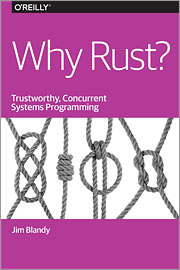
|
FreeComputerBooks.com
Links to Free Computer, Mathematics, Technical Books all over the World
|
|
- Title: Why Rust? Trustworthy, Concurrent Systems Programming
- Author(s) Jim Blandy
- Publisher: O'Reilly Media;
- Paperback: N/A
- eBook HTML, PDF, ePub, MOBI (Kindle)
- Language: English
- ISBN-10/ASIN: N/A
- ISBN-13: 978-1-491-92730-4
- Share This:

|
While systems programming languages have greatly evolved since the introduction of C more than 40 years ago, our capacity for dumb mistakes with enormous consequences has remained unchanged, with vivid examples regularly in the news. This O'Reilly report examines Rust, a new systems programming language that combines safety and security with performance on a par with C and C++.
This book explains how Rust achieves this combination via a sophisticated and flexible type system, working together with a novel "borrow checker." Rust promises:
- No null pointer dereferences. Programs won’t crash because you forgot to check whether a pointer was null.
- No dangling pointers, no leaks. Every value will live as long as it must, and no longer.
- No buffer overruns. Your program will never access elements beyond the end or before the start of an array.
With this book, you'll learn how to put Rust's safety, performance, and trustworthy concurrency to use, and you'll understand how the type system and borrow checker affect the way you write your code.
About the Authors- Jim Blandy works for Mozilla on Firefox's tools for web developers. He is a committer to the SpiderMonkey JavaScript engine, and has been a maintainer of GNU Emacs, GNU Guile, and GDB. He is one of the original designers of the Subversion version control system.
- Rust Programming
- Parallel, Concurrent, and Distributed Computing and Programming
- New and Miscellaneous Computer/Programming Languages
- Computer Programming

- Why Rust? Trustworthy, Concurrent Systems Programming (Jim Blandy)
- The Mirror Site (1) - PDF
- The Complete Rust Programming Reference Guide (Rahul Sharma, et al.)
-
 Rust Atomics and Locks: Low-Level Concurrency in Practice
Rust Atomics and Locks: Low-Level Concurrency in Practice
Helps Rust programmers gain a clear understanding of low-level concurrency. Learn everything about atomics and memory ordering and how to combine with basic operating system APIs to build common primitives like mutexes and condition variables.
-
 The Rust Programming Language (Steve Klabnik, et al)
The Rust Programming Language (Steve Klabnik, et al)
This book is the official book on Rust, an open-source, community-developed systems programming language that runs blazingly fast, prevents segfaults, and guarantees thread safety. It is the undisputed go-to guide to Rust, written by members of Rust core team.
-
 Rust Programming, For Beginners, Quick Start Guide (Ray Yao)
Rust Programming, For Beginners, Quick Start Guide (Ray Yao)
This book gives you a fast introduction to Rust so that you may get started with low-level system programming and developing web applications, network services, and embedded programmes.
-
 A Gentle Introduction To Rust (Steve J Donovan)
A Gentle Introduction To Rust (Steve J Donovan)
This book covers all essential Rust language knowledge. You can learn complete primary skills of Rust programming fast and easily. The book is for beginners and for the college exam, the engineer certification exam, etc.
-
 Rust Cookbook (Rustacean Team)
Rust Cookbook (Rustacean Team)
Practical solutions to overcome challenges of using Rust in creating console and web applications and working with systems-level and embedded code, network programming, deep neural networks, and much more.
-
 Rust by Example (Rust Community)
Rust by Example (Rust Community)
This book is a collection of runnable examples that illustrate various Rust concepts and standard libraries. To get even more out of these examples, don't forget to install Rust locally and check out the official docs.
-
 The Embedded Rust Book (Rust Contributors)
The Embedded Rust Book (Rust Contributors)
Using the Rust Programming on "Bare Metal" embedded systems, such as Microcontrollers. It is for everyone who wants to do embedded programming while taking advantage of the higher-level concepts and safety guarantees the Rust language provides.
-
 Rust and WebAssembly (Rust Community)
Rust and WebAssembly (Rust Community)
This book is for anyone interested in compiling Rust to WebAssembly for fast, reliable code on the Web. You should know some Rust, and be familiar with JavaScript, HTML, and CSS. You don't need to be an expert in any of them.
-
 Rust for C++ Programmers (Nick Cameron)
Rust for C++ Programmers (Nick Cameron)
The intended audience of this book is C++ programmers who want to learn Rust. It covers the differences between Rust and C++ to get you writing Rust programs quickly without lots of material you probably already know.





